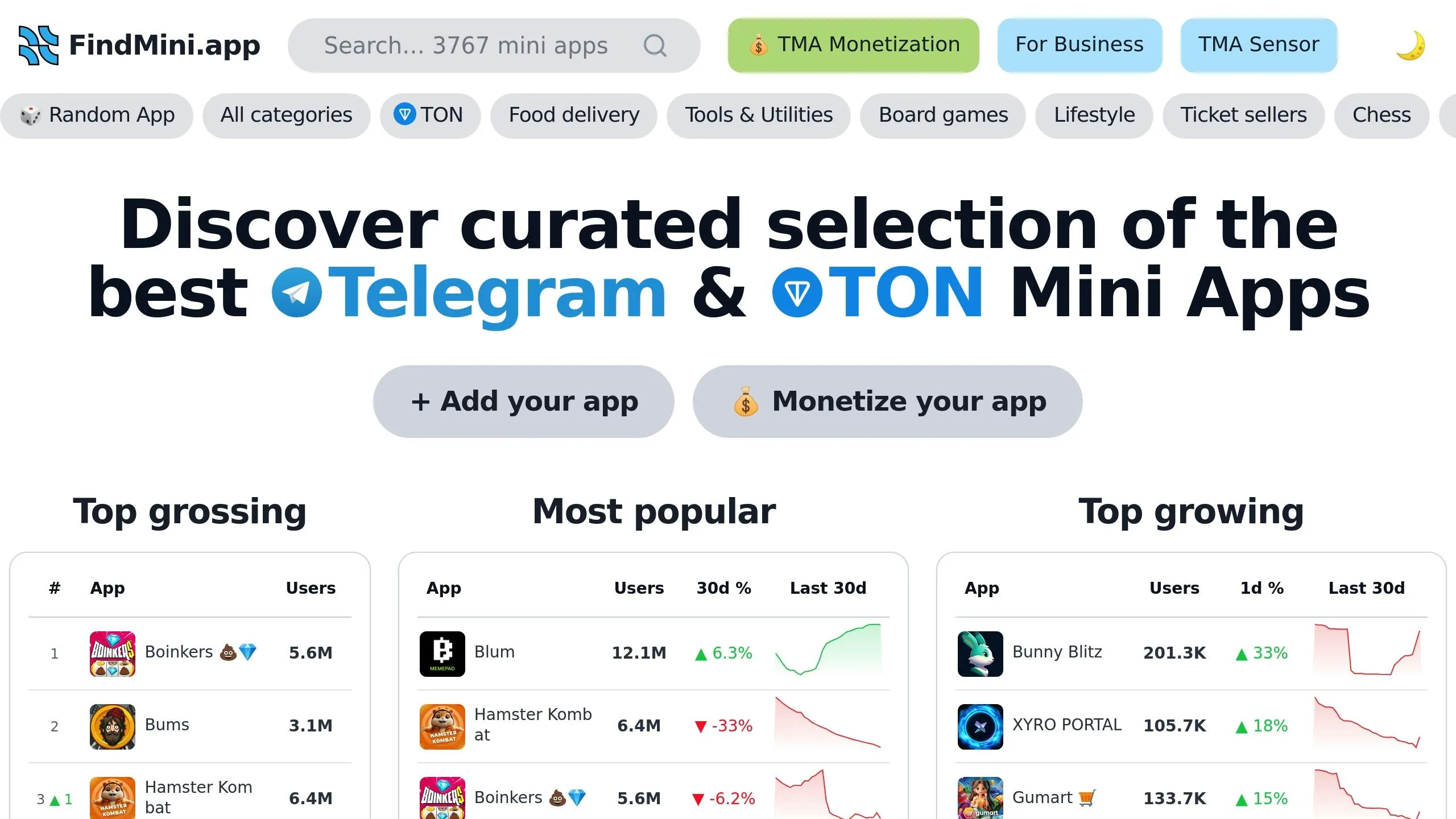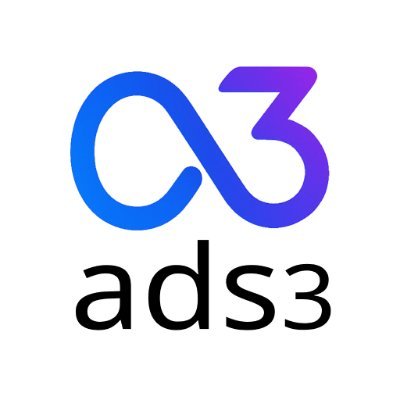Customizing Mini Apps For Web3 Users
Want to build a Web3 Telegram Mini App? Here’s how you can create secure, user-friendly apps that integrate blockchain tools seamlessly into Telegram chats.
Key Points:
-
Wallet Integration: Connect crypto wallets like HOT Wallet or Tonkeeper for managing assets and transactions.
-
Token Features: Add token-based access, staking, and rewards for deeper engagement.
-
Decentralized Identity: Use blockchain-based IDs for secure authentication.
-
Privacy Controls: Implement end-to-end encryption and comply with U.S. privacy laws like CCPA.
-
User Experience: Design simple interfaces with features like live token balances and staking leaderboards.
-
Analytics: Track performance with tools like FindMini.app to monitor user behavior and optimize features.
This guide shows you how to combine these elements to create a Mini App that Web3 users will love.
Make TON Telegram Mini App | 04 | Connect TON Wallet …
Web3 User Behavior Patterns
When designing Mini Apps for Web3 users, it’s crucial to understand their feature preferences and interaction patterns. Web3 users expect specific tools and clear, intuitive workflows. Below, we break down the key features and common user flows to help shape your Mini App development.
Essential Features for Web3 Users
Web3 users are drawn to Mini Apps that integrate blockchain capabilities. For example, platforms like UXUY Wallet, with 3.4 million users, highlight the need for these core features:
-
Token Verification: Automated checks to ensure token accuracy.
-
Transaction History: Transparent logs of on-chain activity.
-
Smart Contract Interaction: Direct access to blockchain protocols for seamless engagement.
These features form the backbone of a strong Web3 Mini App. But understanding how users navigate your app is just as important.
Typical Web3 User Flows
Insights from top-performing Mini Apps reveal consistent user behavior patterns:
-
Initial Engagement
Users typically start with basic functionalities before exploring advanced features. Platforms like Treasury, with 5.3 million users [1], emphasize the importance of smooth onboarding experiences. -
Gaming Integration
Popular gaming apps such as Hamster Kombat (6.6 million users [1]) and Boinkers (5.6 million users [1]) demonstrate the appeal of features like token-based rewards, play-to-earn mechanics, community-driven governance, and on-chain achievements.
By understanding these user flows, you can refine onboarding processes and enhance reward systems for better engagement.
Considerations for the U.S. Market
If your target audience includes U.S.-based users, your Mini App must address key requirements like regulatory compliance, fiat on/off ramps, and strict adherence to data privacy laws.
In the next section, we’ll focus on integrating these features into your Mini App’s wallet and token modules.
Wallet and Token Implementation
Using insights from U.S. compliance and user behavior, wallet and token modules should focus on security and ease of use. Key components like secure wallet connectivity, token-restricted content, and smooth registration processes are essential for building Web3 Mini Apps.
Wallet Connection Options
The UXUY Wallet allows users to manage TON assets directly within chat, while Walletium supports both on-chain transactions and traditional payment methods like Visa and Mastercard[1].
Token-Based Access Features
Token gating limits access to specific features based on a user’s on-chain balance. For example, Hipo App enables users to stake TON tokens to earn rewards, showcasing how staking and balance checks can provide access to exclusive features[1].
Registration Process
During registration, users connect their wallets and stake tokens to access restricted features. With wallets and tokens in place, the next step is customizing your Mini App’s interface.
Interface Personalization
Once you have secure wallets and token gates in place, focus on designing an interface that makes Web3 features easy to use. A thoughtful UI ensures smooth interactions between Telegram’s core features and blockchain tools.
Telegram API Features
-
Use
web_app_expandto create full-screen views for showing token balances or transaction history. -
Leverage
mainButton.show()to prompt users for wallet connections or confirm transactions.
Dynamic UI Elements
Make your interface interactive and responsive by incorporating real-time updates. For example:
-
Show live token balances and staking statuses in the header using conditional rendering.
-
Automatically adjust UI elements when users complete on-chain actions like:
-
Token transfers
-
Governance voting
-
Claiming rewards
-
Web3 UI Examples
Some Mini Apps have nailed Web3 interface design. Here are a couple of standouts:
-
UXUY Wallet: Integrates transaction confirmations directly into inline keyboards, enabling quick, one-tap approvals.
-
Hipo App: Displays staking leaderboards in chat bubbles, encouraging community engagement.
Next, we’ll dive into how decentralized identity and privacy controls can enhance these interface elements.
Identity and Privacy Setup
Securing user identity and protecting data privacy go hand in hand with creating a personalized user experience. For Web3 users, having control over their data is non-negotiable. Let’s explore how to set up decentralized identity solutions and align privacy controls with U.S. regulations.
Decentralized ID Setup
Web3 users value the ability to manage their own digital identities. Using the did:ethr method, users can create blockchain-verified identifiers. Mini Apps can integrate these DIDs through TON Connect, offering a smooth and secure authentication process.
Data Privacy Controls
Giving users control over their personal information is key. Start by implementing end-to-end encryption to secure sensitive data. Separate on-chain (public) and off-chain (private) information into distinct flows, with clear toggles that allow users to manage permissions for each type of data.
U.S. Privacy Standards
In the U.S., compliance with CCPA is essential. Provide users with clear options to opt in or out of data collection and processing. Maintain detailed records of user consent and how their data is handled to meet regulatory requirements.
Once identity and privacy systems are set, it’s time to monitor adoption and performance.
Analytics and Measurement
Use analytics to improve user experiences while respecting privacy and identity controls.
Performance Tracking Basics
Keep an eye on these key metrics:
-
Daily, weekly, and monthly active users (DAU, WAU, MAU)
-
New user growth over a 30-day period
-
Revenue and conversion rates
FindMini.app Analytics Tools

FindMini.app offers developers tools to:
-
Monitor the metrics mentioned above through real-time dashboards.
-
Analyze data on top-grossing, most popular, and fastest-growing Mini Apps.
-
Use promotional features to increase app visibility and attract more users.
Data-Driven Improvements
Leverage analytics to enhance your Mini App’s performance:
-
Identify where users drop off during onboarding or wallet connections, and streamline those processes.
-
Increase engagement by monitoring feature usage and gathering in-chat feedback.
-
Fine-tune monetization strategies by analyzing revenue trends and campaign results.
These insights can help you personalize UI flows and improve wallet-connection prompts effectively.
Conclusion
Combining wallets, personalized interfaces, identity features, and analytics creates a Mini App that truly connects with Web3 users.
Key Takeaways
Building a successful Web3 Telegram Mini App requires secure wallet integration, token-driven functionalities, decentralized identity tools, smooth user experiences, and compliance with U.S. privacy laws.
Core focus areas include:
-
Security: Reliable wallet connections and strong privacy safeguards.
-
User Experience: Simple and intuitive Web3 interactions.
-
Compliance: Adherence to U.S. data and regulatory requirements.
Steps to Get Started
-
Add seamless wallet connections and token gates, then monitor usage and engagement trends.
-
Prioritize U.S. data privacy by ensuring secure storage, clear data collection policies, and gaining user consent.
-
Continuously refine using metrics like DAU, WAU, MAU, and growth rates for actionable insights.


















